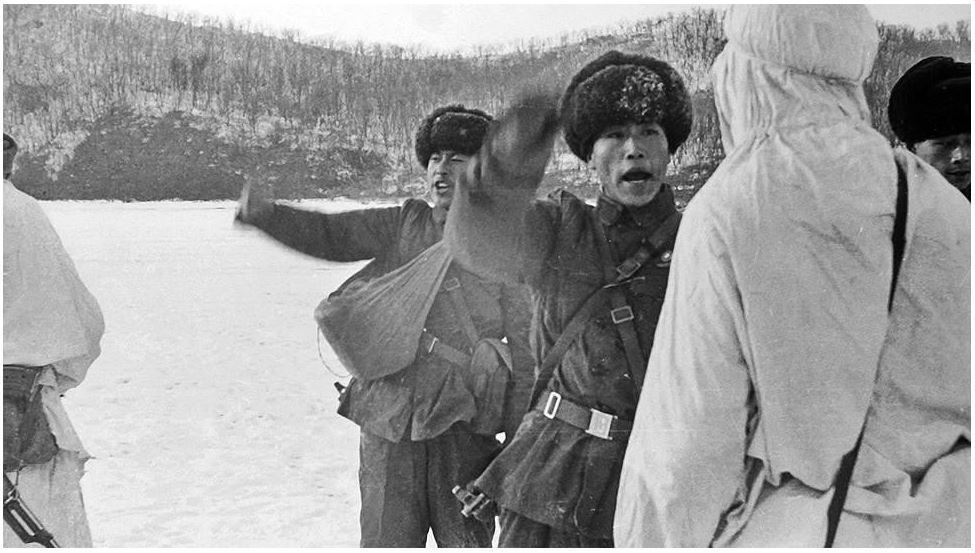Chinese border guards jostle with their Soviet counterparts on the disputed Zhenbao Island, 1969, image obtained from: https://www.historyanswers.co.uk/history-of-war/the-sino-soviet-border-war-why-the-ussr-nearly-nuked-china/
We are wrapping up another class and before I make the short journey back home, I figured that I would try to get an article or two in the works. Don’t get me wrong, I have a few sitting on the desktop that will need to be dusted off but I am trying to get back into the swing of things again and hopefully can set aside a little time to write while I get caught up with the family.
I have been working on another article about China and the regional conflicts that they face when I stumbled into this really interesting article from the Gatestone Institute International Policy Council. Honestly, I don’t know much about this organization/publication but I believe they make some valid points on The Possible Limits of China-Russian Cooperation. Personally, I have always thought Russia and China should be more competitors that partners but I did not know much of the long-seated divisions. There is no doubt that these two countries are the U.S.’s greatest competitors and figuring out a way to split or make their ‘partnership’ more contentious will only benefit U.S. interests in the end. The article notes that:
China and Russia’s coordinated policies in foreign affairs and economic endeavors belie deep-seated fissures that might well prevent their current period of cooperation from evolving into a sustained alliance.
What are those deep-seated fissures you ask? Here is a sample of what the folks at the Gastesone Institute note,
Some Chinese commentators allege that Russia still occupies hundreds of thousands of square miles of Chinese territory seized in Tsarist times. China even recently claimed that Vladivostok, the most prominent city in Russia’s Far East, is historically Chinese territory.
In addition to the centuries old border disputes, there are also major cultural barriers to cooperation.
China and Russia’s profoundly different cultures might also help to limit a bilateral honeymoon. A portion of Russia’s self-image is that of protector of the Slavic World, guardian of the Orthodox Christian faith, and the lead society in the Eurasian landmass from the Urals to the Pacific. Moscow’s historical view of China further seems conflated with a contempt for the Mongols, who cruelly subjugated Russian Slavdom for centuries.
The shear vastness and the abundance of available natural resources that lie just out of China’s reach, with a population that is bursting at the seems, also cannot be ignored.
Siberia, larger than the continental United States and India combined, is home fewer than 35 million people, with hundreds of millions of Chinese just over the border. At some point, China may start eyeing this energy- and mineral-rich region of Russia.
Overall, the article is very good and even though I don’t really know much about the source, the article is very worth your time if you are at all interested the Next Great Power Competition. In addition, there are two other points I think are extremely relevant. First:
President Vladimir Putin’s Russia is clearly the junior partner in the Sino-Russian anti-American “alliance of convenience”…China seems to see Russia less as an economic partner than as a source for extraction of energy and raw materials.
This cannot sit well in Moscow. Playing second fiddle to China when the Russians are attempting to reestablish primacy in the region is not their end goal here. Besides how reliable is a partner that steals from you?
While China in the past purchased billions of dollars of fighter and bomber aircraft from Russia, Beijing has quickly been developing its own arms industry, sometimes reverse engineering Russian weapons systems. Russia, perhaps annoyed at China’s aggressive pattern of copying its weapons systems — such as the SU-27 fighter and the S-300 surface to air missile system — has delayed a planned shipment of its premier S-400 air defense system.
We have talked about China’s proclivity for ‘intellectual appropriation’ plenty already (here and here for a quick recap). I just don’t understand how any country or business trusts them in the realm of intellectual property.
In the end, if the U.S. wants to change the rules of the current Great Game. I think the Russia-China ‘partnership’ and the divisions that lie therein are areas we should seek to exploit and this article is a really good read on some fissures that could be ripe for exploitation. Read the whole thing.
On a side note, in my search for a good image, I stumbled into this really good article on History Answers titled The Sino-Soviet Border War: Why the USSR nearly nuked China.

